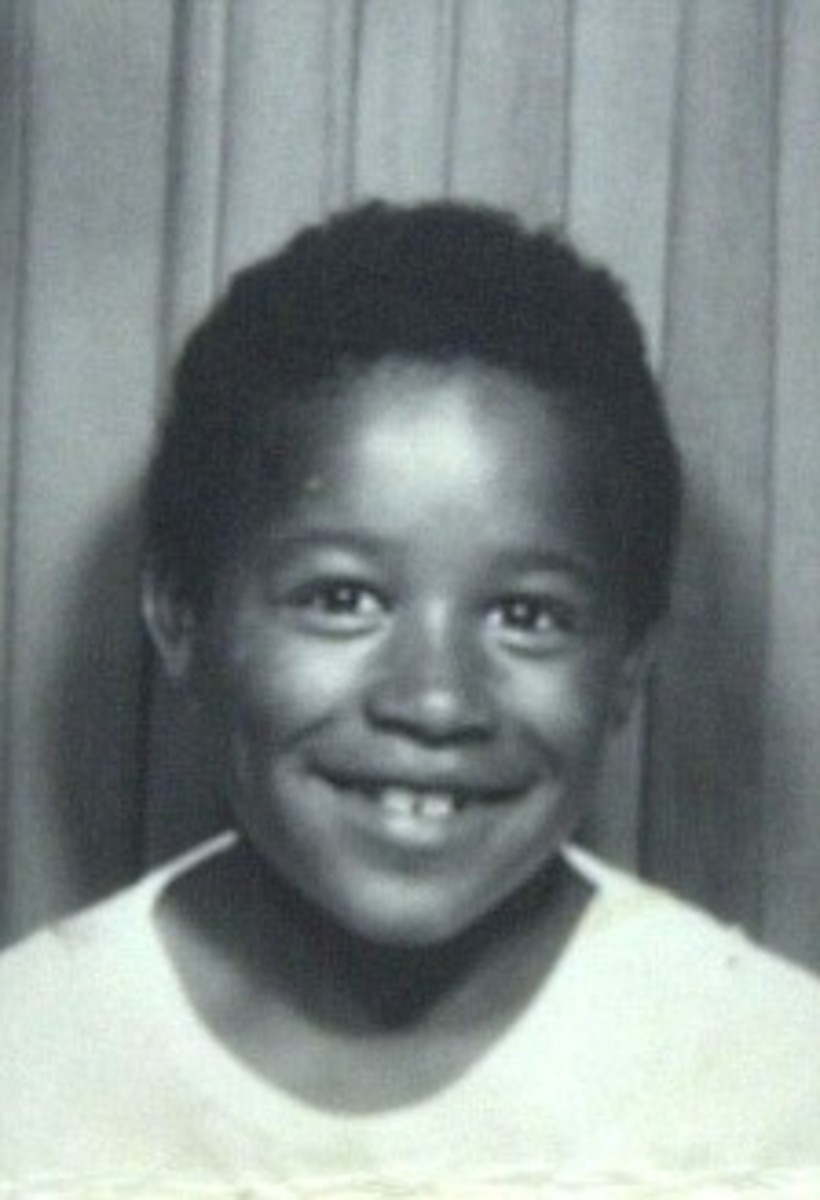American Society Has Always Been Comfortable With Its Social Borders - An Essay

Human life within any societal convention has borders. These borders are either unspoken rules or assumed regulations that keep each archetype or faction protected. This protection is basically a societal code or label determined by affluence, educational levels, or brute force. These borders establish the rules, regulations, and a sense of belonging within our habitation. Although borders are pre-established, we innately tempt their rigidness to find the ones we are comfortable in crossing.
The story of the Garden of Eden is one of the first stories we all either hear or learn about as children. That being stated, it is also one of the first examples we learn about borders. In the story, "Adam and Eve lived in a beautiful paradise that God had created called the Garden of Eden. There were many animals to talk to and play with and all sorts of different fruit trees to eat from. Two of these trees were very special: The Tree of Life, and The Tree of the Knowledge of Good and Evil. God told Adam and Eve that they could eat as much fruit from the Tree of Life as they wanted, but warned them that they must never, ever eat the fruit from the Tree of the Knowledge of Good and Evil (Eden)."
From this we all know, they both ate the fruit they were warned not to. The internet has countless articles with theologians and theories on why the fruit was eaten. The serpent's lie is the catalyst, but curiosity is a part of human nature. "Eve looked at the forbidden fruit and saw that they looked fresh and delicious (Eden)." We are drawn to what appeals to our senses. Paul C Holinger M.D. wrote, "Interest, or curiosity, appears to be one of the nine or so feelings—or responses to stimuli—with which we are born. Interest is crucial to our learning, exploratory activities, and creativity. The psychologist Sivan Tomkins has explored this feeling (“affect”) in depth. Jaak Panksepp, a neuroscientist, calls this reaction “SEEKING” (his capitals)." If something appeals to our senses and we have a desire to obtain or know something more about it, we will. The border is the challenge of how to acquire something that we want.
Our borders give us protection and keep others out. Even though that may seem harsh, keeping others out gives us a sense of comfort. All of us have sides and frailties in our personalities that we do not want the world to know. We can create a perception of who were are through our fashion, diction, and social media. However, unless we live together, we do not know each other. When you witness how someone you live with experiences a life crisis, then you know them.
Society establishes borders so that each archetype has its protection line. When I was a kid my parents lived in an upper middle class, newly built neighborhood. My dad used a push mower and the next-door neighbor (Mr. Steve) had an older (long in the tooth) riding mower. The yards were big, it would take my dad three days to get ours manicured. After a couple of months of casual conversations, a business purchase was made. Dad bought that old riding mower from Mr. Steve. A month later, it was in the shop. Two months later, it was in the junkyard. Dad ended up building a chicken wire fence to indirectly display his disdain. He enclosed his property. Mr. Steve did the same transaction on his side of suburbia. Nothing was casual anymore, they were marking each others' territory. They each wanted the privacy and protection of not having to communicate with each other.

There are aspects of our human nature (selfishness) where we just don't want our possessions to be tampered with. William Berry, LMHC wrote, "Selfishness negatively impacts our interpersonal relations, and can be a focal point for personal growth. The issue lies in becoming aware of when being self-centered. All too often self-centeredness goes unnoticed as a result of unconscious processes. Scientific studies have amassed a number of unconscious biases, many of which are predispositions that fulfill one's ego. This is self-serving and, as such, selfish." Creating or setting borders gives us the selfish comfort of indirectly telling individuals, 'This is mine and I am not willing to share it with you.'
When I started as another neophyte in the corporate workforce, a mentor I worked with gave me incontestable advice. Ms. Karen was snarky, brusque, boisterous, and humorous. She said, "Don't let anyone borrow any of your books (pleasure reading during breaks). You'll never get them back and they'll always have an excuse." After two new employers, two new co-workers (trusted) I lent books to, and two decades of former friends later, she was spot on. She knew the outcome because she was older than me and had experienced it. She knew lending those possessions to co-workers would result in them not being returned. I had to adjust and become selfish with things that had personal value to me. I also had to understand that by the majority, people are not going to be considerate with things that do not belong to them.
Knowing what to expect from the borders we set gives us power. Author Beatrix Haselsberger wrote, "Going beyond definitions, it is important to recognize borders as socially constituent power practices, which give a demarcation in space its meaning and by doing so represent “time written in space” (Popescu, 2012 Popescu, G. (2012). Bordering and ordering the twenty-first century. Understanding borders. Plymouth: Rowman & Littlefield. [Google Scholar]; Van Houtum, 2011 Van Houtum, H. (2011). The mask of the border. In D.Wastl-Walter (Ed.), The Ashgate Research companion to border studies (pp. 49–61). Farnham: Ashgate. [Google Scholar]). Also, borders have both material and symbolic appearances and meanings. They can have a very obvious physical presence (e.g. the “Iron Curtain”) and/or a visually indistinct one, which becomes reality through, for example, stereotyping of the “others” behind the border."
I had a small track record of the "Oh, I must have lost it somewhere" excuses from high school and in those early corporate years. Is it that hard to wash and return Tupperware when someone prepared the food that you said you wanted to try? I kept being patient, kept expecting those items might turn up, and kept inviting people to cross that border. My membership in the social constituency of society ascertained me with a degree of power (setting a personal border). That power came from the choices I made. Henceforth, whether it involved a material possession, an unspoken declaration, or presumptive symbolism, a choice to react on that power had to be made. We either choose to vocalize what our expectations are with our possessions or we can assume what the outcome will be.
Borders are lines that are set on a map, in society they can be set by unspoken rules. "Borders are not just 'visible lines' in space or on a map; on the contrary, they are complex social constructions, with many different meanings and functions imposed on them (Haselsberger)." Unspoken rules are the most universally used and classificatory examples of borders. Their signals and lore can have the same impact as urban legends within a community network. These unspoken rules are applied at every physical age and environment that we coexist with as a populace.
At another one of my employers, there was another lady who was an office veteran. She (Ms. Sara) had been with the company for at least ten years and maintained a diffident veneer. She had her desk with adornments, one of which was a vase. To me, it looked like an oversized coffee mug, but to her, it was HER VASE. We were in a call center environment, but on her side of the office and duties, they did not take incoming calls. They were strictly administrative support. During this time, there were more employees and temps yielding customer complaints than cubicles for us to sit. We had to work weekends and her team did not. It got so busy that the supervisors allowed us to use their desks to yield calls. I had to move her vase out of its sacred spot to make room for my daily projects. After my shift, I put her adornments back in order.

On that Monday morning when I walked over to retrieve a project I left. Ms. Sara, obviously flustered, had a barrage of questions about why her vase was moved. Even before I left my shift that weekend a co-worker told me, "Miss Sara doesn't like anyone sitting at her desk." The person, place, or time did not matter. Whoever sat at Ms. Sara's desk was going to get the same reaction.
Written rules and laws are restrictions that help keep order. Laws are borders that have been set to be enforced. The Open Education Sociology Dictionary (OESD) indicates, "Definition of Law - (noun) A formal or informal rule or standard (mores) enacted by a political entity and enforced by agents with recognized authority such as the police and the courts." These laws are established, not assumed, and we know there are consequences for crossing these borders.
Any member of society is going to intentionally or unintentionally break a law. For the more daring, breaking unspoken rules or written laws is done for the exhilaration of it. We are all human, in that, we naturally have a deviant nature. The variance of our deviance depends on what that behavior (vice) is, how it is perceived in society, and how rash the individual is to have those vices exposed to society.
Author William Little wrote, "According to sociologist William Graham Sumner (1840–1910), deviance is a violation of established contextual, cultural, or social norms, whether folkways, mores or codified law (1906). Folkways are norms based on everyday cultural customs concerning practical matters like how to hold a fork, what type of clothes are appropriate for different situations, or how to greet someone politely. Mores are more serious moral injunctions or taboos that are broadly recognized in a society, like the incest taboo. Codified laws are norms that are specified in explicit codes and enforced by government bodies. A crime is, therefore, an act of deviance that breaks not only a norm, but a law. Deviance can be as minor as picking one's nose in public or as major as committing murder."
He continues, "John Hagen provides a typology to classify deviant acts in terms of their perceived harmfulness, the degree of consensus concerning the norms violated, and the severity of the response to them (1994). The most serious acts of deviance are consensus crimes about which there is near-unanimous public agreement. Acts like murder and sexual assault are generally regarded as morally intolerable, injurious, and subject to harsh penalties. Conflict crimes are acts like prostitution or smoking marijuana, which may be illegal but about which there is considerable public disagreement concerning their seriousness. Social deviations are acts like abusing serving staff or behaviors arising from mental illness or addiction, which are not illegal in themselves but are widely regarded as serious or harmful. People agree that these behaviors call for institutional intervention. Finally, there are social diversions like riding skateboards on sidewalks, overly tight leggings, or facial piercings that violate norms in a provocative way. However, they are generally regarded as distasteful, or for some cool, but harmless."
The granny that drives 10 mph over the speed limit is probably not a hardened criminal. The underage college kid drinking alcohol (an open container or labeled) walking past a police officer may not be a disguised societal threat. A young lady wearing a black hoodie, facial piercings, and a member of the 'Dilated Pupils' rock band doesn't have to be a chronic wallet lifter. Minorities trying on formal attire at a clothing store are not, by probability, preparing for a funeral. The commonality of deviance with all these individuals is indicated. Social constructions, preconceptions (stereotypes), interpersonal communication, and our physical perception of society (presentation) will affect how crossing those borders are considered to authority figures.
Individually, I am one that supports the "rules are made to be broken" mantra. I will cross social borders for a personal challenge and help curb my contemptuous side. Growing up as a member of Generation X, smartphones and social media isn't how you joined a social group. Our popularity was based on social cliques. You either wanted to be in a clique, you got accepted into one, or you became an outcast (sometimes criminal). All social outcasts have that wakening moment in their lives when they realize, 'We have nothing in common (The way contemporary society views the world and what they want out of life ain't for me).' When this occurs, the outcast stops trying to fit in or conform with contemporary (society) metrics. A choice was made of whether to cross a border and be viewed as an outcast (social blacklist) or live and portray the folkways of what social clique I gained access to.
The consequences of crossing those borders are painful, but I was willing to accept it. Society is moved and manipulated by money, beauty, and power. Any office culture will prove that when given time in those nuisances. All of us carry scar tissue from high school and university associates (#irritants). Therefore, it doesn't take long for separatism to initiate between the privileged and the automatons. We are all familiar with the 30-second rule on making a first impression. The outcast knows that you have to maintain that grandiose impression around co-workers daily. Whatever clique I'm in, I have to live up to the standards and unspoken rules of it. I have to follow the folkways and never change my demeanor. Once you change (maturity, wisdom, goal seeking, establish your own family, ect.), instantaneously you are expected to move back in rhythm (age happily while gritting and bearing their miasma) with the people around you.
I had a supervisor (Miss Linda) that I'd cordially known from another company we worked for. She's the reason why I got the job. She interviewed me for my previous job and remembered my name years later. I had seen her out with some other colleagues at a local pub I frequented, so that was a group bonding night. After that, we were both consistently nice to each other passing through the hallways, but now we were daily colleagues. Inadvertently, I crossed a border in our work relationship and her comfort level with my then consistent personality changed.
There was nothing of the sexual connotation. We would see each other at group dinner (co-worker) engagements and enjoyed the weekend refreshments. She was older, socially needy, and treated her staff like she was a hipster Old Mother Hubbard. She was a divorcee and living with her boyfriend of five years. Some of their children from previous relationships lived with them and her brother as well. Her boyfriend played guitar in a cover rock band, so from that, I thought it would be ok to be chummy with her.
She invited me out to watch him play at a small bar. At the time, to me, it wasn't a big deal. Big mistake. It was her and her brother's show with all their closest cronies. She was the only person I knew. Her boyfriend played while she danced like a giddy prom queen. After the alcohol kicked in, so did all of her "supervisor" insecurities. I listened, supported, and gave her reassuring affirmation. I became her sounding board and corroborator for "cool supervisor" verification. She consistently asked me to attend gigs he had around town; I made sure I always had other plans. She stopped inviting me and started finding petty ways to elicit me with infractions. I had fallen from her favor. I was banished from the refreshment club.
Crossing borders is comfortable for individuals that see them as challenges. Some people thrive on being the antithesis of the social constructs they occupy. I will say to me back then, it was fun and interesting studying people at social engagements outside the workplace. What I didn't think about is 'that they were studying me too.'

The boundaries that we cross can elicit fear in others. Rules are made as a form of protection of property, personal space, and money. Rules give an established order to social norms. "Norms generally are the rules and regulations that groups live by. Or perhaps because the words, rules and regulations, call to mind some kind of formal listing, we might refer to norms as the standards of behavior of a group. For while some of the appropriate standards of behavior in most societies are written down, many of them are not that formal. Many are learned, informally, in interaction with other people and are passed 'that way' from generation to generation" ("Social Norms").
"The term 'norms' covers an exceedingly wide range of behavior. So that the whole range of that behavior may be included. Sociologists have offered the following definition. Social norms are rules developed by a group of people that specify how people must, should, may, should not, and must not behave in various situations" ("Social Norms").
When the norm is broken, the feeling of untrust or being manipulated is the result. Interpersonal relationships are so delicate, in that, each individual is expected to keep their end of the barter. Trust and verification are how we can signify the difference between a casual or personal relationship. By agreeing to trust each other and showing each other consistent behavior (virtue) over time (verification), we are showing what our partnership means. If you have established trust and verification, a social norm can be broken without instant complications. Within any society, if we do not value each other's views, opinions, or have a shared goal, then we are, unfortunately, expendable to each other.
Innately, we cross boundaries that we want to gain a new level of accessibility to. Really, in every aspect of life, we make choices to determine what borders we are willing to cross because we know they exist. Political activist Aisha Dodwell wrote, "Borders barely exist for the movement of capital, and multinational companies can easily cross borders to extract resources and exploit labor. It is fundamentally unfair that corporate bosses can move jobs across the world, while ordinary workers do not have the freedom to move themselves. We should be controlling capital and freeing people, not the other way round." We as individuals are aware of rank and hierarchal order in society. Our bank accounts, job titles, personal branding, and equity dictate these by ownership. There are sects in society that we choose to want access to. 'Someone or some group has something that I want, so how can I get it?' We may gain access to these sects with doors being opened through education, networking, favoritism, or social commonality. Once access is granted, we appraise how hard and long (time) we are willing to work to maintain the expected social norms (unspoken rules) of that sect.
Globally, society lacks the willingness to allow outsiders to openly cross and accept each other's borders. We identify these limitations as obstacles. Individually, we choose to cross or maneuver our way through obstacles, if not, we remain stationary. We cannot determine the outcomes of the social blights we face. The fact remains, we can determine our preparation and personal fortitude to cross them.
Works Cited:
“The Story of the Garden of Eden, for Kids.” Free Stories for Kids, 12 Mar. 2016, https://www.freestoriesforkids.net/garden-of-eden/. Accessed 31 Oct. 2019.
Holinger, Paul. “The Curious Human.” Psychology Today, Sussex Publishers, 31 Jan. 2017, https://www.psychologytoday.com/us/blog/great-kids-great-parents/201701/the-curious-human. Accessed 31 Oct. 2019.
Berry, William. “You're So Selfish.” Psychology Today, Sussex Publishers, 19 Apr. 2016, https://www.psychologytoday.com/us/blog/the-second-noble-truth/201604/youre-so-selfish. Accessed 31 Oct. 2019.
Haselsberger, Beatrix. “Decoding Borders. Appreciating Border Impacts on Space and People.” Taylor & Francis Online, Vienna University of Technology, 29 Oct. 2014, https://www.tandfonline.com/doi/full/10.1080/14649357.2014.963652. Accessed 31 Oct. 2019.
Bell, Kenton. “Law Definition.” Open Education Sociology Dictionary, https://sociologydictionary.org/law/. Accessed 31 Oct. 2019.
Little, William. “Introduction to Sociology – 2nd Canadian Edition.” Introduction to Sociology 2nd Canadian Edition, BCcampus Open Education, https://opentextbc.ca/introductiontosociology2ndedition/chapter/chapter-7-deviance-crime-and-social-control/. Accessed 31 Oct. 2019.
Sumner, W. G. (1955). Folkways. New York, NY: Dover. (Original work published 1906).
Hagen, J. (1994). Crime and disrepute. Thousand Oaks, CA: Pine Forge Press.
“Social Norms, Sociology Norms, Basic Concepts of Sociology Guide.” Sociologyguide.com, https://www.sociologyguide.com/basic-concepts/Social-Norms.php. Accessed 31 Oct. 2019.
Dodwell, Aisha. “7 Reasons Why We Should Have Open Borders.” New Internationalist, New Internationalist, 29 Nov. 2017, https://newint.org/blog/2017/11/29/why-open-borders. Accessed 31 Oct. 2019.
© 2020 Sy





